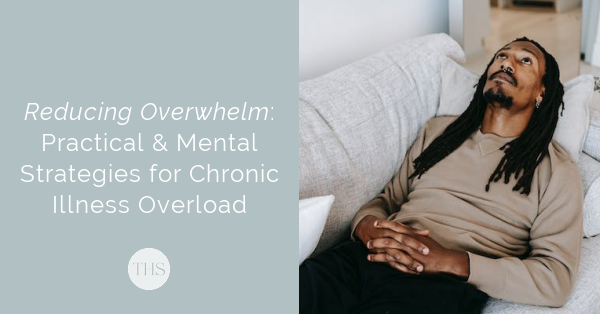How to Stock Your Natural Medicine Cabinet

You likely already know that living with a chronic health condition is a layered experience. Your life may not just be affected by the physical sensations of an illness. There’s a range of mental and practical elements to handle, from managing medical appointments, sticking to therapy and making lifestyle changes to adjusting to your new reality.
Even things that should be fun, like the holiday season or going on vacation, can feel like another chore on your plate when you have to plan around obstacles like limited energy, pain and other symptoms. Alongside the demands of everyday life, it’s no wonder that you might occasionally get that dreaded sensation of being overwhelmed.
While it’s important not to underestimate the impact of overwhelm, it’s just as vital to recognize there are actions you can take. By taking a little time to look closely at the causes of overwhelm and adopt some effective strategies, you can minimize the effects. Perhaps most importantly, you can regain a sense of control over this aspect of your life.
Your experience of chronic illness is unique to you, based on your individual perspective. This applies to your experience of being overwhelmed, too. While some general tools can help you better manage it, you should also tailor your approach to meet your needs. You can begin by gaining an understanding of the selection of triggers that prompt your overwhelm. This applies to those directly related to your illness and other life aspects.
Some steps you can take to narrow down your triggers include:
You may find that there’s no single trigger to the sense of overwhelm. It might be a combination of factors. In either case, you should consider this information empowering. It’s a tool that gives you the freedom to make informed decisions about coping mechanisms and preventative measures.

One of the worst things about getting overwhelmed during a chronic illness is it can feel like yet another sensation of being out of control. The good news is that practical actions can enable you to regain a sense of agency. When reducing overwhelm, take a look at the core triggers. Consider where you can implement preventative actions that minimize the mental and emotional toll they take on you.
Your practical actions will depend on the triggers. So, let’s look at a couple of common examples.
Finances can be a significant source of stress. This can be particularly common with chronic illness if your condition leads to needing additional time off work or paying for medical services. Therefore, one of your practical mitigating steps can be to find ways to save money on day-to-day expenses. This could include using public transportation to save on gas or using smart apps to monitor and reduce your electricity consumption. You could also save on groceries with a combination of clipping coupons and disciplined list-making.
Your living situation may well contribute to the sense of being overwhelmed. For instance, many adults today have roommates. The stresses that come from living with other people may exacerbate your experience of chronic illness to contribute to the overwhelm.
This is where it’s important to take practical steps to make living with roommates a more positive experience. Start by setting clear boundaries, particularly in regard to protecting your private spaces. This gives you somewhere to retreat and decompress. Make arrangements for regularly discussing finances, chores and other points of tension, so they don’t build over time. These types of communication and organization can lighten the mental load.
Dealing with doctor’s appointments, managing your medication and following a new exercise regimen or medical diet can be a lot to handle, especially if you’re newly diagnosed. Depending on your situation, there are several things you can do to reduce health-related overwhelm.
Make sure to jot down all appointments in your calendar and plan rest time before and afterwards to pace your energy. You could also use a medical journal to track your symptoms and potential triggers as well as health habits you’re building. It helps to set reminders on your phone to do your physical therapy exercises at home or to take your meds (that you’ve already sorted by day or week in a pill organizer).
Finally, don’t make too many lifestyle changes at once, and try to build new habits on top of existing ones, like having your vitamins with your daily cup of coffee in the morning.

Reducing overwhelm when you have a chronic condition isn’t just about controlling the things around you. The sensations tend to be primarily emotional and psychological. Some of these may be immediate responses to difficult situations. Others could develop over the long term. Therefore, it’s important to adopt mental resources that help you address these.
Some approaches you can take include:
These types of exercises can be powerful tools. That said, it’s important to remember that psychological elements that lead to overwhelm can be complex. You may find it useful to collaborate with a therapist that specializes in chronic health conditions. They’ll be able to provide you with insights and help you explore your own feelings in a safe space. Together, you can devise the most relevant solutions for you.
Being overwhelmed while living with a chronic condition can be particularly difficult. Yet, there are empowering steps you can take to address it. These include understanding your triggers, taking practical preventative measures, and adopting strong psychological coping mechanisms.
You may not be able to avoid the sense of overwhelm entirely, you’re only human and you’ve got a lot to deal with! Nevertheless, each action that brings calm and control into your life should be a victory you celebrate.
Get more practical tips on how you can prevent digital overload when you rely on your electronic devices, or learn emotion-focused strategies to deal with uncontrollable stress.